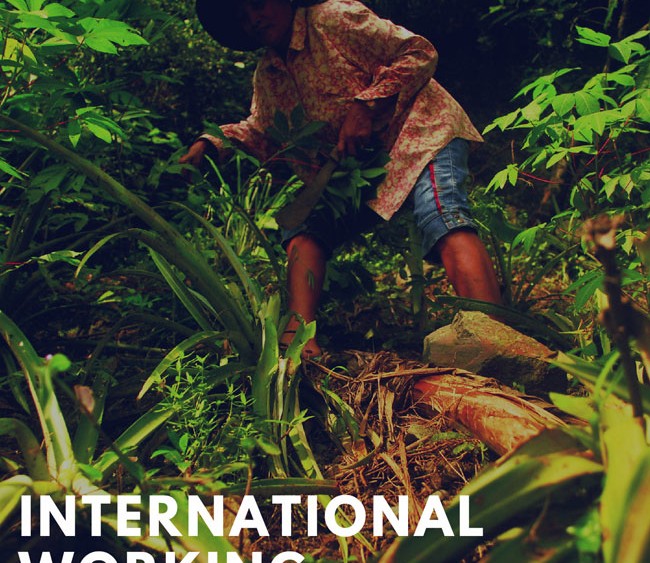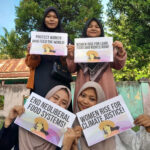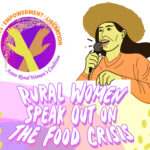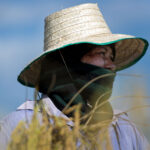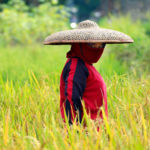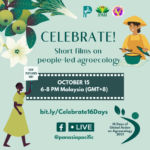Fight Back Imperialist Globalisation, Militarism and Religious Fundamentalism!
As we celebrate International Working Women’s Day today, we also mourn the death 5 days ago of Berta Caceres: a Lenca woman leader and environmental activist murdered for the defense of her people and their lands in Honduras. Her life and struggle mirrors that of women around the globe, who suffer but fight back against imperialist globalisation and militarism.
After three decades of neo-liberal globalisation, and as its economic and social crisis deepens, women all over the world face intensified exploitation, oppression, multiple forms of discrimination and violence. Women and families coming from underdeveloped countries suffer worse conditions, as the burden of the imperialist crisis is shifted to their countries.
Mining displaces indigenous women and entire farming communities from their homes, livelihoods, and native cultures. Armies, police and mining company goons inflict gross human rights abuses to the displaced population as well as to those resisting mining. This plunder of natural resources has also resulted to climate change and catastrophic disasters. Rural women bear the brunt of climate change and disasters, as they are in charge of food production, water supply and maintaining families’ homes. Environmental and natural disasters place women and children most vulnerable to health risks, while placing women at higher risks of harm and even death when disasters strike.Neo-liberal globalisation intensifies inequalities of wealth, power and resources between countries, between rich and poor, and between men and women. It further escalates land, water and resource grabbing in the imperialist drive for profit and geo-political control, concentrated in the hands of big transnational and local corporations and landlords, for dams, mining, agricultural plantations and aquacultures. These displace peasant women, indigenous women, fisherfolk women and their families, as well as other rural sectors sourcing their livelihoods from the land and waters. Peasant and indigenous women’s role as food producers and seed keepers are drastically eroded, putting food security and safety at risk and farmers at the mercy of patented and genetically modified seeds.
Within the framework of neo-liberal economic agenda, the US-led TPPA (Trans Pacific Partnership Agreement) will deepen imperialist economic control of poor and underdeveloped countries in the region as it further opens up land and resources to imperialist plunder. For toiling women of Asia, this will mean further economic oppression.
When imperialist interests are at stake, militarism in the form of wars of aggression and interventions are not far behind. The TPPA is partnered with the “US pivot to Asia” which will strengthen US economic, military and political control in the Asia Pacific as well as contain China as a threat to US power in the region. This will bring about heightened political repression in countries like the Philippines where US-puppet regimes are installed and are eager to surrender national sovereignty. For women activists, movements and human rights defenders in the region, this spells heightened human rights violations and political repression.
Religious fundamentalism is on the rise in the past years, especially in South Asian countries like India. Generated and fanned by the protracted and worsening crisis of imperialism, religious bigotry with the support of imperialist forces, state and non-state actors, have intensified rural women’s invisibility, further restricted women’s civil and political rights, legitimated violence against women, revived religious sanctioned prostitution, perpetuated discrimination and denied women’s inherent right to control their lives, bodies, sexuality and resources. Fundamentalisms and imperialist globalisation processes interact with caste discrimination denying Dalit women the right to life, land, and equal status with men.
Rural women in Asia condemn and resist land and resource grabbing, militarism and fundamentalism and is in solidarity with the women of the world resisting imperialist globalisation.
We reaffirm our demand and persevere in the struggle for genuine agrarian and aquatic reforms and rural women’s ownership and access to land, waters and other resources; food sovereignty and ecological biodiversity based agriculture; the right to self-determination; the right to fair living wages, job security, freedom of association and our demand for development justice.
We reaffirm our demand and resolutely struggle for an end to all state-led, state-supported wars; justice for all human rights defenders and affected communities; the prioritization of basic social services over military budgets; the repeal of repressive laws and an end to extra judicial killings and enforced disappearances.
We reaffirm our demand and determinedly struggle for an end to the caste system and untouchability practices; our inherent right to life with dignity; our sexual and reproductive health and rights; and our right to political representation at all policy levels to represent different religions, ethnic groups and marginalised sectors.
Rural women in Asia are more resolute and more militant in organising, educating and mobilising its ranks, and links its struggles and movements with the peoples’ movements in different countries and the world anti-imperialist movement.
We call on the young generation of rural women to link arms with us and the toiling women all over the world, to collectively march towards our liberation.
Rights, Empowerment and Liberation!
Women of the world unite! Fight back imperialist globalisation, militarism and fundamentalism!
Reference: Sarojeni Rengam and Marjo Busto, Secretariat, arwc-secretariat@asianruralwomen.net
###
*The ARWC is facilitated by the Steering Committee (SC) body composed of 10 member groups of national formations/alliances and regional organisations working on rural women’s issues. The SC members include national alliances: Tamil Nadu Women’s Forum (TNWF) and Society for Rural Education and Development (SRED) in India; Tenaganita in Malaysia; Human Development Organization (HDO) in Sri Lanka; INNABUYOG and GABRIELA National Alliance of Women’s Organization in the Philippines; and the All Nepal Women’s Alliance (ANWA) in Nepal. Regional networks include Asia Pacific Forum on Women, Law and Development (APWLD), Asian-Pacific Resource and Research Centre for Women (ARROW), and Pesticide Action Network Asia and the Pacific (PANAP).

